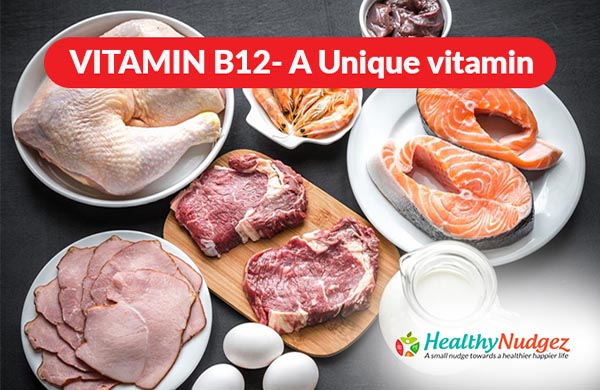Vitamin B12- A Unique vitamin
Vitamin B12 is a unique B-complex vitamin. Unique because despite being water soluble and having a large molecular structure it can be stored in liver. Our body needs vitamin-B complex for many essential functions.
Vitamin B12 is a large vitamin having cobalt (a metal) in centre of its structure, thus it is also known as cobalamin.
Vitamin B12 is needed for the proper functioning of the brain, nervous system and for formation of red blood cells. It is also helpful in energy production as it acts as co-factor in macronutrient metabolism.
Vitamin B12 deficiency has become very common these days due to lifestyle changes. This vitamin needs an intrinsic factor present in our gut for its absorption. Due to increasing gut issues, there is a rapid increase in malabsorption of vitamin B12, which leads to its deficiency in large population.
Studies have shown that moderate to severe vitamin B12 deficiency, induced anxiety and other behavioural anomalies in a person.
Population at risk of B12 deficiency:
- Vegans are mostly at a higher risk of vitamin B12 deficiency as apart from fortified cereals, the only reliable sources of B12 are meat, dairy and dairy products. People having gut problems like celiac, Crohn’s disease, gastric issues, ulcerative colitis are also at higher risk due to malabsorption.
- Elderly people(age> 50 years) are at a high risk of vitamin B12 deficiency due to gastric issues(gastritis).
- Studies showed that low serum B12 concentration is also common in people with type 2 diabetes who are on oral anti-diabetic drugs.(only some of the drugs, pl consult your Doctor)
B12 deficiency symptoms:
- B12 deficiency includes symptoms like weakness, fatigue, numbness, tingling of hands or feet, memory loss, sore tongue and poor coordination.
- Its deficiency also leads to megaloblastic anaemia (as in cases of pernicious anaemia).
- Deficiency of vitamin B12 leads to elevated levels of homocysteine which is associated with risk of heart disease.
- In children vitamin B12 deficiency leads to poor motor skills.
Sources of vitamin B12:
Milk, eggs (yolk), seafood (like tuna, sardines, salmon), liver and milk products like processed and cottage cheese, butter and yogurt.
Vegetarian sources include aloe vera, yeast, fermented foods like idli, dosa, sprouts etc and fortified cereals, but the bio-availability of vitamin B12 in these foods are very minimal.
(Calcium and protein rich foods help in the absorption of this vitamin in intestine).
According to ICMR (2010) Recommended Daily Allowance (RDA) for vitamin B12 is around 1.0 mcg/day for adults. About 1 cup or 150 gm per day of sea food or 3 cups of milk or equivalent products is sufficient to meet the RDAs.
Systematic screening (blood test) is advisable from time to time in elderly people and in patients having persistent deficiency symptoms.
It is recommended that, one should consult a physician before taking supplements of any vitamin in form of pills or injections.

